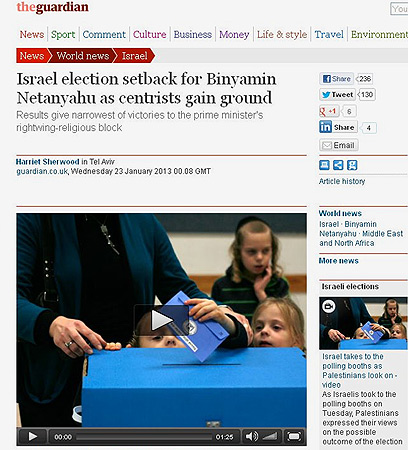
Worldwide media enthralled by Israeli elections
General elections, their results and ramifications featured prominently in international media. NYT calls drop in Likud power 'humbling rebuke'; Lapid dubbed 'chief power broker'
Much of the international coverage focused on the new division of power and the possible ramifications on Israeli policy, especially on the Israeli-Palestinian peace process.
Related Stories:
- Lapid sets agenda for next government
- Putting governmental puzzle pieces together
- 19th Knesset to see Right, Left virtually tied
The New York Times dedicated its headline to the Israeli election results. "Tepid vote for Netanyahu in Israel is seen as rebuke," the paper wrote, adding that "a weakened Prime Minister Benjamin Netanyahu emerged Wednesday from Israel's national election likely to serve a third term."

According to the paper, Netanyahu entered the race as the preferred, clear and uncontested candidate but the outcome was a "humbling rebuke," since his party lost seats in the parliament.
The NYT determined that "Over all, his conservative team came in first, but it was the Center, led by the political novice Yair Lapid, that emerged newly invigorated, suggesting that at the very least Israel’s rightward tilt may be stalled."

"Charismatic leader helps Israel turn toward the center," was the headline for the complimentary profile piece the newspaper dedicated to the 19th Knesset election's big winner: "Mr. Lapid, 49, was the surprise of the Israeli election," Isabel Kershner, the NYT's Israel-based correspondent wrote.
"With his good looks and suave manner, Yair Lapid had long been a celebrity and symbol of success here, building a strong following as a prominent journalist and the host of a popular television show," she wrote flatteringly.
On Lapid's newfound leveraging abilities, Kershner wrote, "The Centrist Yesh Atid Party won 19 seats in the 120-seat Parliament, positioning Mr. Lapid as the chief power broker in the formation of the next governing coalition."

The Washington Post wrote that the Israeli elections weakened Netanyahu and increased the chances for more centrist policies likely to ease the tension with US President Barack Obama's government in Washington; signifying much greater flexibility in the efforts to make peace with the Palestinians.
According to the Washington Post, Netanyahu's party remained the largest in the Knesset but "Its shrunken size means that Netanyahu will be more dependent on smaller coalition partners to cobble together a governing majority."

The Wall Street Journal, wrote that "Prime Minister Benjamin Netanyahu and his allies were sharply weakened in election results Tuesday, pushing him to try to form a coalition government with his opponents that stands to be more moderate but less stable."
The WSJ also wrote that these moderate parties support the currently stagnant peace process with the Palestinians and that the right bloc has been reduced from 66 seats to 61 according to the exit polls.

The newspaper also noted that Netanyahu admitted that the election outcome displayed the public's dissatisfaction with Israel's current situation.
The BBC's Kevin Connolly said that "The results show that there's plenty of life on the left and the center of Israeli politics too," but that "the sudden and decisive lurch to the right that many predicted hasn't happened."

Harriet Sherwood of Britain's Guardian also wrote on the weakening of the rightist bloc and said that "Netanyahu remains on course to continue as prime minister, as his right-wing electoral alliance, Likud-Beiteinu, is the biggest party after winning 31 of 120 seats in the next parliament. But it was a sharp drop from the present combined total of 42 for the two parties."
France's Le Figaro spoke too of Netanyahu's decline and suggested that the Israeli PM form a centrist coalition with Lapid on the inside.
Roi Simyoni contributed to this report
- Receive Ynetnews updates directly to your desktop










